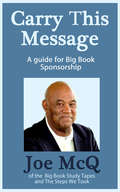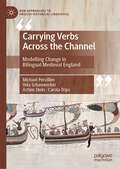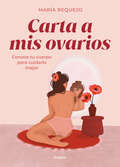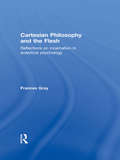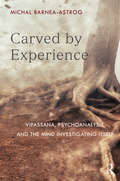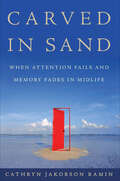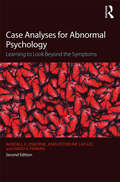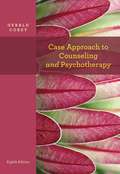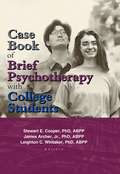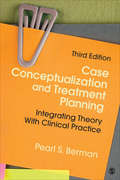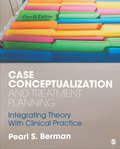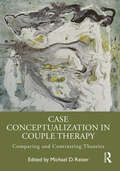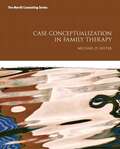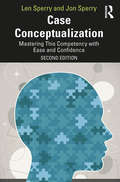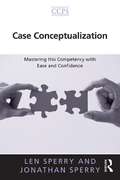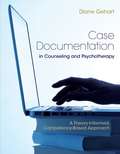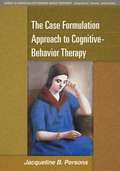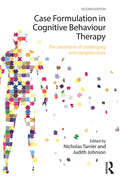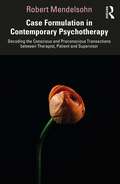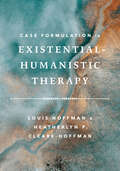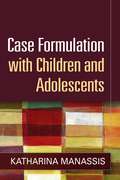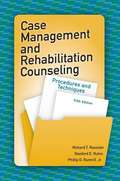- Table View
- List View
Carry This Message (Addiction Recovery Series #7)
by Joe McQ“Having had a spiritual awakening as the result of these Steps, we tried to carry this message to others, and to practice these principles in all our affairs.”-STEP 12 of the TWELVE STEPSSponsorship is a key construct in A. A. and other Twelve Step groups, and the twelfth step is the foundation of the sponsorship dynamic essential to recover – both for the sponsor and the sponsoree.This book addresses the concern of many in the A. A. community that sponsors have lost some skills in working with alcoholics. By offering tools for helping others find recovery and new life through the Twelve Step program, Joe McQ has created a guide for sponsors to use in working with others.By refocusing his readers on the Big Book, the Twelve Steps, and their message, McQ appeals for a return to the roots and essence of the A. A. program. Moreover, he issues a strong call to action, for return to the fullness and the integrity of the miraculous recovery program.
Carrying Verbs Across the Channel: Modelling Change in Bilingual Medieval England (New Approaches to English Historical Linguistics)
by Achim Stein Michael Percillier Yela Schauwecker Carola TripsThis book examines grammatical changes that took place in the medieval language contact situation between English and French from 1066 until 1500. It investigates structural copying phenomena and their connection with the lexicon, finding that copying of lexical verbs with a predicate-argument structure accelerated wider grammatical changes, and shows why the traditional notion of borrowing should be replaced with the more adequate concept of copying. The authors start by taking a fresh look at the relationship between Old French and Middle English in light of recent developments in the fi eld of linguistics, arguing that what has traditionally been seen as a diglossic situation (i.e., as contact between the dominating speakers of French and the native speakers of English) should instead be analysed through the framework of bilingualism. The two contact scenarios under scrutiny are the ones between Old French and Middle English and Middle English and the contact variety of Anglo-French. On the basis of their case studies they develop a holistic model of contact-induced change that integrates the bilingual individual as well as the speech community and its sociolinguistic background. This book will be of interest to students and scholars of language history and change, language contact and acquisition, sociolinguistics, multilingualism, and psycholinguistics.
Carta a mis ovarios: Conoce tu cuerpo para cuidarlo mejor
by María RequejoUna guía práctica e inspiradora sobre salud femenina que nos ayuda a escuchar, comprender y cuidar mejor nuestro cuerpo. «Tu cuerpo tiene que ser capaz de funcionar solo. Confía en él». A partir de esta premisa, la autora nos acompaña para entender qué es el ciclo menstrual, cómo funcionan las hormonas, cuáles son los desequilibrios más frecuentes, sus síntomas y cómo nos afectan los disruptores endocrinos, la epigenética y la sobremedicalización. Pero, sobre todo, nos enseña a recuperar nuestro bienestar a través de cuatro pilares fundamentales: 1. Nutrición 2. Movimiento 3. Descanso 4. Gestión del estrés Comienza así una revolución. La que permite que las mujeres podamos volver a tomar el control, a disfrutar de los procesos naturales, a sentirnos sanas y con energía y a elegir desde el conocimiento y el sentido común.
Cartas a Pedro: Guía para un psicoterapeuta que empieza
by Loretta Cornejo ParoliniDespués de su libro Manual de Terapia Infantil Gestáltica, la autora nos presenta Cartas a Pedro. Guía para un psicoterapeuta que empieza. Nace de la reflexión ante el hecho de que, cuando un profesional termina su formación como terapeuta y a pesar de todos los seminarios, talleres y conferencias, se encuentra con que la sensación de inseguridad ante el reto que se le presenta, aún persiste. Esto es normal en todo estudiante que tiene que lanzarse a definirse y a poner en práctica lo que ha visto de modo teórico o experimental.Cartas a Pedro tiene como objetivo resolver muchas dudas de orden práctico, que tal vez no se hayan tocado en el entrenamiento terapéutico, pero que son importantes para sentirse más seguro y, al mismo tiempo, tener una referencia que luego el terapeuta decidirá o no seguir. Trataremos sobre el uso del tiempo, el por qué de la duración de las sesiones ?tanto en su inicio como en su terminación?, los miedos del terapeuta, las escenas temidas, qué hacer cuando un paciente no habla o no viene, el manejo de las resistencias, el clima emocional necesario para acoger a un paciente... Y presentaremos algunos ejercicios prácticos basados en la Terapia Gestalt que al menos aporten al ?cesto del terapeuta? herramientas que ayuden a explorar ciertos temas que a veces se evaden pero que están en la mente de todos.Cartas a Pedro transmite algo difícil de aprender en los libros de texto, el amor a la profesión, el amor al trabajo terapéutico, el amor al paciente.
Cartesian Philosophy and the Flesh: Reflections on incarnation in analytical psychology
by Frances GrayHow do you know anything is true? What relation is there between my psyche and your psyche, does one exist? Can we doubt everything or are some things indubitable? What does Jung have to say about body and psyche, body and mind? Cartesian Philosophy and the Flesh is an analysis and critique of interpretations of Cartesian philosophy in analytical psychology. It focuses on readings of Descartes that have important implications for understanding Jung, and analytical and existential psychology generally. Frances Gray's book raises questions about the 'place' of the body in a theory of the human psyche and about what kind of psyche, if any, is essential to concepts of human being. Gray claims that the debates around Descartes and metaphysical dualism have been oversimplified and that this has had a profound effect on conceptualizing an on-going relation between psyche and body. The book also explores the relationship between Jung's conception of the phenomenological standpoint and that of Edmund Husserl and Maurice Merleau-Ponty. Cartesian Philosophy and Flesh brings together Descartes’ idea of self-interrogation and self-reflection and Jung's project in The Red Book, the practice of spiritual exercises is the underpinning orientation of both men. It recommends similar practices to anyone interested in the truths of their own living. Gray’s book will be of interest to Jung scholars, and those with an interest in Jungian studies, Analytical Psychologists and Philosophers.
Carved by Experience: Vipassana, Psychoanalysis, and the Mind Investigating Itself
by Michal Barnea-AstrogHow does the tendency to crave pleasure and reject pain shape our lives? How does it affect the way we perceive reality, and how is it related to the emergence of suffering and the way it is experienced and transmitted? Can we live free of this tendency, beyond the pleasure principle? This book approaches these questions through an examination of the psychoanalytic concepts of projection and projective identification in the light of early Buddhist thought. It looks at the personal and the interpersonal, at theory, meta-theory, and everyday life. It observes how the mind's habits mould the human condition, and investigates its ability to free itself from their domination. It examines the potential of this liberation: to be in touch with reality as it is and live a less reactive, more ethical life.
Carved in Sand: When Attention Fails and Memory Fades in Midlife
by Cathryn Jakobson RaminA journalist tackles her growing forgetfulness and inability to concentrate as she seeks to understand how the brain works.Why can’t you remember where you put your keys? Or the title of the movie you saw last week?Anyone older than forty knows that forgetfulness can be unnerving, frustrating, and sometimes terrifying. With compassion and humor, acclaimed journalist Cathryn Jakobson Ramin explores the factors that determine how well or poorly one’s brain will age.She takes readers along on her lively journey—consulting with experts in the fields of sleep, stress, traumatic brain injury, hormones, genetics, and dementia, as well as specialists in nutrition, cognitive psychology, and the burgeoning field of drug-based cognitive enhancement. Along the way, she turns up fresh scientific findings, explores the dark regions of the human brain, and hears the intimate confessions of high-functioning midlife adults who—like so many of us—are desperate to understand exactly what’s going on upstairs.Praise for Carved in Sand“[An] insightful and well-researched journey through memoryland.” —Scientific American Mind“The variety of perspectives and the wealth of scientific information Ramin provides, as well as her warm personal style, will reward readers and may well help them stay mentally sharp.” —Publishers Weekly
Case Analyses for Abnormal Psychology: Learning to Look Beyond the Symptoms
by Randall E. Osborne Joan Esterline Lafuze David V. PerkinsCase Analyses for Abnormal Psychology, Second Edition uses case studies to explore the etiology, biology, and dynamics of psychiatric disorders in the DSM-5. Readers will learn about the new classifications and treatments for disorders while simultaneously reading the personal history of each consumer both before and during the development of each case. Every case ends with a section on the particular disorder presented, as viewed from a biological perspective. This updated edition bridges advances in abnormal psychology and neuroscience in understanding mental illness.
Case Approach to Counseling and Psychotherapy
by Gerald CoreyCASE APPROACH TO COUNSELING AND PSYCHOTHERAPY, Eighth Edition, vividly illustrates how major counseling approaches work with a single client, Ruth. Dr. Corey provides solid examples of psychoanalytic, Adlerian, existential, person-centered, Gestalt, reality, behavior, cognitive-behavior, family systems, feminist, and postmodern theories in action. Dr. Corey applies each therapeutic approach to a single client, illustrating how the various theories work and helping you see exactly how the techniques differ. Well-respected and widely recognized practitioners serve as guest commentators, offering their unique perspectives on Ruth's case. Commentators include founders of some of the therapies, such as William Glasser for choice theory and reality therapy, Arnold Lazarus for multimodal therapy, and Albert Ellis for rational emotive behavior therapy.
Case Book of Brief Psychotherapy with College Students
by Leighton Whitaker Stewart Cooper James Archer JrShort-term therapy doesn't have to be second-best!This valuable book explores a variety of brief therapy approaches with young adults between 17 and 25. Each case discussion thoroughly covers the salient points of the client, the problem, and the treatment, as well as segments of the treatment transcripts that illustrate the critical aspects of the counseling. A post-hoc question-and-answer section explores alternative ways the therapist could have handled the client and allows in-depth examination of successful treatment approaches. Case Book of Brief Psychotherapy with College Students offers constructive suggestions for dealing with common presenting problems, including: depression individuation issues PTSD impulse control in mandated psychotherapy cult membership post-rape trauma bereavement issuesWith comprehensive references and a fascinating variety of presenting problems, Case Book of Brief Psychotherapy with College Students is a helpful resource for any psychologist, social worker, or therapist whose clients include young adults.
Case Conceptualization and Treatment Planning: Integrating Theory With Clinical Practice
by Dr Pearl Susan BermanUsing compelling client interviews and skill-building exercises, this practical book shows students how to tailor clinical work to the specific background of a client using any theoretical perspective. Thoroughly revised and expanded, the Third Edition of Case Conceptualization and Treatment Planning, by Pearl S. Berman, adds two new theoretical orientations (cultural therapy and the cognitive-behavioral model) and includes exercises for expanding student self-awareness of personal biases.
Case Conceptualization and Treatment Planning: Integrating Theory With Clinical Practice
by Dr Pearl Susan BermanUsing compelling client interviews and skill-building exercises, this practical book shows students how to tailor clinical work to the specific background of a client using any theoretical perspective. Thoroughly revised and expanded, the Third Edition of Case Conceptualization and Treatment Planning, by Pearl S. Berman, adds two new theoretical orientations (cultural therapy and the cognitive-behavioral model) and includes exercises for expanding student self-awareness of personal biases.
Case Conceptualization and Treatment Planning: Integrating Theory With Clinical Practice
by Dr Pearl Susan BermanCase Conceptualization and Treatment Planning: Integrating Theory With Clinical Practice teaches students in counseling, psychotherapy, and clinical psychology how to develop the case conceptualization and treatment planning skills necessary to help clients achieve change. Author Pearl S. Berman provides client interviews and sample case studies in each chapter along with detailed steps for practice and developing treatment plans. Chapters conclude with questions that engage students in critical thinking about the complexity of human experiences. The updated and expanded Fourth Edition includes cutting-edge issues in trauma-informed care; responsiveness to development across the lifespan; integration of issues relevant to intersectionality of oppression; and evidence-based practice.
Case Conceptualization and Treatment Planning: Integrating Theory With Clinical Practice
by Dr Pearl Susan BermanCase Conceptualization and Treatment Planning: Integrating Theory With Clinical Practice teaches students in counseling, psychotherapy, and clinical psychology how to develop the case conceptualization and treatment planning skills necessary to help clients achieve change. Author Pearl S. Berman provides client interviews and sample case studies in each chapter along with detailed steps for practice and developing treatment plans. Chapters conclude with questions that engage students in critical thinking about the complexity of human experiences. The updated and expanded Fourth Edition includes cutting-edge issues in trauma-informed care; responsiveness to development across the lifespan; integration of issues relevant to intersectionality of oppression; and evidence-based practice.
Case Conceptualization in Couple Therapy: Comparing and Contrasting Theories
by Michael D ReiterThis textbook provides undergraduate and graduate students with a comprehensive and in-depth exploration of the primary models of couples counseling, allowing them to compare and contrast each theory alongside a single case.Designed to be the core text for couple therapy courses, the book begins by introducing the field as well as presenting Carissa and Steve, a couple whom readers will follow as each model is applied to their case. The chapters focus on 11 different theoretical models such as Bowen family systems theory, emotionally focused couple therapy, the Gottman method, solution-focused couples counseling, narrative couple therapy, and more, with expert therapists writing on each of these unique models. Each chapter addresses the history of the model, the conceptualization of problem formation, diversity considerations, and the conceptualization of problem resolution. With session transcripts throughout, this book allows training therapists to easily compare, contrast, and apply the most prevalent models in couples counseling.This textbook is a core text for graduate marriage and family therapy, mental health counseling, clinical psychology, and social work students. The book is also useful for practicing professionals who want to explore how to apply a specific model of counseling to couples.
Case Conceptualization in Family Therapy
by Michael D. ReiterIn this highly-anticipated new text for courses in family therapy, key concepts and techniques of the most prominent family therapy models are presented and put into practice. Each chapter utilizes the same unique case family to explore the intricacies of how that model views the theory of problem formation as well as the theory of problem resolution. Readers will work their way through nine engaging theory chapters written from the perspective of the founder. As theories are presented, the development of a case conceptualization will take shape and a deeper understanding of the unique situation of one case family currently having difficulties will be explored and studied, and a solution as to what course of treatment might be most appropriate will be evaluated.
Case Conceptualization: Mastering this Competency with Ease and Confidence
by Len Sperry Jon SperryIntegrating recent research and developments in the field, this revised second edition introduces an easy-to-master strategy for developing and writing culturally sensitive case conceptualizations and treatment plans. Concrete guidelines and updated case material are provided for developing conceptualizations for the five most common therapy models: CBT, psychodynamic, biopsychosocial, Adlerian, and Acceptance and Commitment Therapy. Chapters also include specific exercises and activities for mastering case conceptualization and related competencies and skills. Also new to this edition is a chapter on couple and family case conceptualizations, and an emphasis throughout on trauma. Practitioners, as well as graduate students in counseling and clinical psychology, will gain the essential skills and knowledge they need to master case conceptualizations.
Case Conceptualization: Mastering this Competency with Ease and Confidence (Core Competencies in Psychotherapy Series)
by Jonathan Sperry Len SperryThis is the type of book instructors, trainees, and clinicians need--a short text that demystifies the case conceptualization process and provides a streamlined method for learning and mastering this competency. It presents an integrative model for conceptualizing cases, dispels common myths about case conceptualization, and provides straightforward guidelines and strategies for mastering this essential competency. Writing clinically useful case conceptualizations is no longer optional today, and this training guide is the only resource you will need to increase your expertise and incorporate this competency in professional practice. Five detailed clinical case studies are referred to throughout the book, and exercises are presented at the end of the last five chapters to help readers in deriving Cognitive-Behavioral, Dynamic, Solution-Focused, Biopsychosocial, and Adlerian case conceptualizations from an integrative assessment. Drs. Len and Jonathan Sperry also address cultural sensitivity and offer guidelines for developing cultural conceptualizations and selecting culturally-sensitive treatments. All techniques are easy to understand and use, ensuring that readers will master this competency and feel confident applying it to difficult cases.
Case Documentation in Counseling and Psychotherapy: A Theory-Informed, Competency-Based Approach
by Diane R. GehartCase Documentation in Counseling and Psychotherapy teaches counselors and psychotherapists how to apply counseling theories in real-world settings. The book provides a comprehensive introduction to case documentation using four commonly used clinical forms: case conceptualization, clinical assessment, treatment plan, and progress note. These documents are uniquely designed to incorporate counseling theory and help new practitioners understand how to use theory in everyday practice. Case studies illustrate how to complete documentation using each of seven counseling models: psychodynamic, Adlerian, humanistic, cognitive-behavioral, family systemic, solution-focused, and postmodern/feminist. <p><p> Readers also learn about the evidence base for each theory as well as applications for specific diverse populations. Outcome-based pedagogy engages readers in an active learning process. The book's case documentation assignments-created using national standards for counseling, family therapy, psychology, and social work-empower readers to apply theoretical concepts and develop professional skills early in their training. With its practical overviews of theories, conceptualization, treatment planning, and documentation, this is a book that future mental health professionals will want to keep and use as a clinical reference manual for years to come.
Case Formulation Approach to Cognitive-Behavior Therapy
by Jacqueline Persons Marsha LinehanThis eagerly awaited book shows how skillful case formulation addresses a critical challenge in psychotherapy today how to use empirically supported therapies (ESTs) in real-world clinical contexts. The author explains the basic theories of cognition, learning, and emotion that underlie available ESTs and shows how the theories also guide systematic case formulation. By crafting a sound formulation and continually refining and monitoring it as treatment progresses, the therapist can smoothly "shift theoretical gears" and weave together elements of different ESTs to meet the needs of individual patients, who typically present with multiple problems. Hands-on tools, reproducibles, and many concrete examples are included.
Case Formulation in Cognitive Behaviour Therapy: The Treatment of Challenging and Complex Cases
by Nicholas Tarrier Judith JohnsonSince the successful first edition of Case Formulation in Cognitive Behaviour Therapy, there has been a proliferation of psychological research supporting the effectiveness of CBT for a range of disorders. Case formulation is the starting point for CBT treatment, and Case Formulation in Cognitive Behaviour Therapy is unique in both its focus upon formulation, and the scope and range of ideas and disorders it covers. With a range of expert contributions, this substantially updated second edition of the book includes chapters addressing; the evidence base and rationale for using a formulation-driven approach in CBT; disorder-specific formulation models; the formulation process amongst populations with varying needs; formulation in supervision and with staff groups. New to the book are chapters that discuss: Formulation amongst populations with physical health difficulties Formulation approaches to suicidal behaviour Formulation with staff groups Case Formulation in Cognitive Behaviour Therapy will be an indispensable guide for experienced therapists and clinical psychologists and counsellors seeking to continue their professional development and aiming to update their knowledge with the latest developments in CBT formulation.
Case Formulation in Contemporary Psychotherapy: Decoding the Conscious and Preconscious Transactions between Therapist, Patient and Supervisor
by Robert MendelsohnCase Formulation in Contemporary Psychotherapy presents a new approach to case conceptualization and case formulation, making meaning from each clinical case and using every piece of data available. Robert Mendelsohn explains his core basic principles for case formulation, allowing the clinician to assess a case quickly and accurately. This book includes a discussion of the contributions of transference and countertransference, inducement and enactment, as well as the use of paradigmatic techniques, humor, and language. The processes presented, alongside vignettes illustrating their use, will allow clinicians to decode the meaning of all clinical interaction and to communicate that meaning in a helpful way to students and patients. Providing a new way to access a full range of conscious and preconscious clinical information, Case Formulation in Contemporary Psychotherapy will be essential reading for mental health professionals including psychotherapists and psychodynamic and psychoanalytic clinicians in practice and in training. It will also be of great interest to students of psychotherapy and psychoanalysis.
Case Formulation in Existential–Humanistic Therapy
by Louis Hoffman Heatherlyn P. Cleare-HoffmanThis book presents a nonhierarchical, liberatory case formulation framework for existential–humanistic (EH) therapy that balances structure and adaptability. The authors have developed a flexible template that prioritizes general principles and client collaboration over scripted procedures or techniques. It emphasizes EH therapy&’s dynamic, creative approach while offering a structure that makes EH therapy easy to learn for students and to help practitioners meet insurance needs and to operate within regimented treatment settings. Each section of the case formulation template is detailed in its own chapter. These chapters cover: holistic narratives of the client&’s background and experiences; techniques for identifying the client&’s concern/problem, putting the client&’s perspective and systemic issues ahead of the diagnostic process; the theoretical aspects of case formulation, emphasizing important factors like the client&’s strengths and resources, biopsychosocial influences, and existential challenges; and treatment planning based on the client&’s evolving needs and goals. A recurring case example illustrates how to fill out each of these sections and is supplemented by other case examples.
Case Formulation with Children and Adolescents
by Katharina ManassisHighly practical and accessible, this book shows how to synthesize complex information about child and adolescent mental health problems into clinically useful, dynamic case formulations. Strategies and tools are provided for analyzing the biological, psychological, social, cultural, spiritual, and developmental factors that may be contributing to the difficulties of clients ages 4-18. Numerous case examples illustrate the steps in crafting a comprehensive formulation and using it to plan effective, individualized treatment. Strategies for overcoming frequently encountered pitfalls in case formulation are highlighted throughout.
Case Management And Rehabilitation Counseling: Procedures And Techniques
by Richard RoesslerCase Management and Rehabilitation Counseling is an excellent primary textbook for rehabilitation counseling and practicum courses. The fifth edition of Case Management and Rehabilitation Counseling is compatible with the seventh edition of Foundations of the Vocational Rehabilitation Process (Rubin, Roessler, & Rumrill, 2016). By combining the seventh edition of Foundations with the fifth edition of Case Management and Rehabilitation Counseling, rehabilitation educators can effectively coordinate a two-semester study of the foundations, components, and operations of the rehabilitation process and the role and function of the rehabilitation counselor in managing that process in various public and private service settings. <p><p> With 349 new references, the new and updated material expands the amount of information on multicultural considerations in counseling, family involvement in the rehabilitation process, the use of technology in case reporting and record keeping, and reasonable accommodation in the workplace. Thus, the reader gains an up-to-date understanding of counseling and case management skills within the current practice milieu of rehabilitation services.
